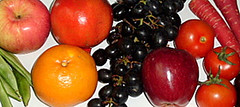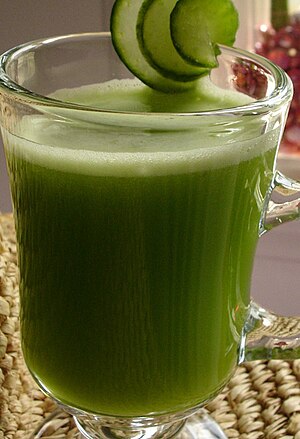Get Your Five a Day
| Fruits and vegetables (Photo credit: nutrilover) |
But, for many, eating five to ten servings of vegetables a day is not so easy. A busy schedule can sabotage your healthy eating habits. In an effort to get what you need, you can try juicing.
According to nutritional guidelines, a serving of vegetables is equal to ¾ cup of vegetable juice. You will catch a break with juice and you can drink it in half the time that it takes to eat some vegetables - plus it's easy to take with you when you're on the go.
Commercial Vegetable Juices
Be careful when choosing juices from the store. They can contain hidden sugars and other additives so read labels carefully. Choose an organic vegetable juice that contains lots of different vegetables: green leafy veggies, carrots, tomatoes, herbs and others.
Many vegetable juices can help you make up the numbers for your daily servings. Just keep in mind that juice is not meant to be a substitute but a supplement. If you can only eat three or four servings a day, adding juice can give you two or three more. The goal is to try and up your natural intake of vegetables.
A benefit of commercial vegetable juices is the variety. Vegetables that you might not otherwise have tried to juice are included and so are their nutrients. However, keep in mind that they will never be as fresh or nutritious as juices you make yourself at home.
| Cucumber, celery & apple juice (Photo credit: Wikipedia) |
Another choice for vegetable juice is to get your own juicer. The advantage here is that you know exactly what is in each drink you make, and the vegetables you juice will be fresh. There are no preservatives. You can make up a fresh cup of vegetable juice whenever you want one.
Secondly, fresh vegetables have a marvelous taste. Many people haven’t even tasted the natural sweetness of vegetables. Juicing them gives you a chance to taste what they are really all about.
Thirdly, you can experiment with your own combinations. Try carrots with kale or pumpkin. How about spinach, lemongrass and dandelion greens? Juice one vegetable at a time and taste it. Mix a bit of one with another to see what you like.
Vegetable juice can help you to increase your daily intake of vegetables. If you are having a hard time fitting it all in, here is a way to help you. Buy commercial juices that don’t contain added sugars. And for a more natural taste and even more nutrients, invest in a juicer and make your own.
A Few Good Juicers:



No comments:
Post a Comment